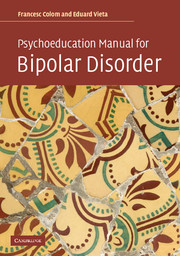Book contents
- Frontmatter
- Contents
- Foreword
- Preface
- Part 1 Clinical, diagnostic, and therapeutic aspects of bipolar disorders
- Part 2 Concept and methodology of psychoeducation
- Psychological treatment and bipolar disorders: why psychoeducate?
- Mechanisms of action of psychoeducation
- Integrating psychoeducation in clinical practice
- When to introduce psychoeducation?
- Formal aspects of the psychoeducation program
- Part 3 Psychoeducation program: sessions and contents
- Bibliography
- Index
Formal aspects of the psychoeducation program
from Part 2 - Concept and methodology of psychoeducation
Published online by Cambridge University Press: 06 January 2010
- Frontmatter
- Contents
- Foreword
- Preface
- Part 1 Clinical, diagnostic, and therapeutic aspects of bipolar disorders
- Part 2 Concept and methodology of psychoeducation
- Psychological treatment and bipolar disorders: why psychoeducate?
- Mechanisms of action of psychoeducation
- Integrating psychoeducation in clinical practice
- When to introduce psychoeducation?
- Formal aspects of the psychoeducation program
- Part 3 Psychoeducation program: sessions and contents
- Bibliography
- Index
Summary
Number and type of patients
The ideal size of a psychoeducation group is between 8 and 12 patients. It is possible to work with fewer than 8 participants, but this can reduce the wealth of the patients’ contributions and opportunities to interact. Working with more patients can often be very uncomfortable for the therapists as well as for the patients, because they can think that the therapists are not paying enough attention or that, because of time restrictions, they do not have enough time to take part in the roundtable discussion. Furthermore, it is very difficult to develop a feeling of belonging to a group if it is too large. This often results in poor adherence with the group's schedules as well as with the rest of the rules, and in general, poor involvement of the patients. Since the dropout rate is around 25%, we have observed that it is useful to start the group with 15 or 16 patients, which ends up being reduced to 10–12 after the first four or five sessions. However, if we start with about 10 patients, as we had done in the pilot groups prior to the clinical trial, we can end up with more than 25% dropouts, because the patients do not want to join a group with fewer than 8 participants. Thus, in one of the groups we ended up working with only four subjects.
- Type
- Chapter
- Information
- Psychoeducation Manual for Bipolar Disorder , pp. 45 - 50Publisher: Cambridge University PressPrint publication year: 2006

